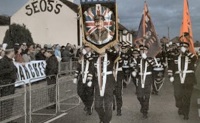
There are fears that disputes over the issue of forced sectarian parades through nationalist areas of the north of Ireland could ignite as a deadline looms for the agreement of a draft plan on the issue.
Sinn Fein Deputy First Minister Martin McGuinness told the Orange Order to face up to the fact they could no longer march in nationalist areas where people did not want them at an IRA commemoration at the weekend.
“The Orange Order has to sit up and take notice that the world is changing all around them, that the north is not an Orange state, recognise that not alone have the old days gone, but the days of the triumphalist Orange marches through areas where they are not wanted have to be consigned to the history books forever,” he said.
He also criticised the Orange Order leadership for continuing to refuse to engage with republicans.
“And they should come forward, like men and women, and come into rooms, sit and talk to representatives of the nationalist/republican community in areas where they are seeking to march.
“Thus far, they have refused to do that, but that’s what they must do in the course of the coming period.”
DUP Deputy leader Nigel Dodds described Mr McGuinness’s comments as “republican propoganda” and demanded an apology.
“At a time when people are strenuously working for a resolution to outstanding issues, Mr McGuinness decides to play to his own gallery with a cliche-ridden attack on the Orange Institution,” he said.
“That sort of republican propaganda might play well with his hardcore supporters, but it will not instil community confidence throughout Northern Ireland on other important matters.”
A six-strong ‘working group’ of the Belfast Assembly comprised of three DUP and three Sinn Fein members are due to present their proposals for resolving the issue of sectarian marches tomorrow.
Today residents’ groups in two areas where parade routes are a matter of long standing dispute -- the Lower Ormeau road in Belfast and the Garvaghy Road in Portadown, Co Armagh -- published the submission they sent to the group.
They said they were making the correspondence public because they were concerned that the group’s final submission to the First Minister and deputy First Minister would not be disclosed.
“This would be counter to any sense of openness, transparency and fairness regarding this process,” Gerard Rice from the Lower Ormeau group and Breandan Mac Cionnaith from the Garvaghy Road body wrote in a joint letter.
The document reflects the desire of residents in the affected communities to live in peace and called for contentious parades to take identified alternative routes away from nationalist areas.
It also called for public gatherings to recognise the European Convention on Human Rights “and the right to live without fear of intimidation”.
![[Irish Republican News]](https://republican-news.org/graphics/title_gifs/rn.gif)
![[Irish Republican News]](https://republican-news.org/graphics/title_gifs/harp.gif)

